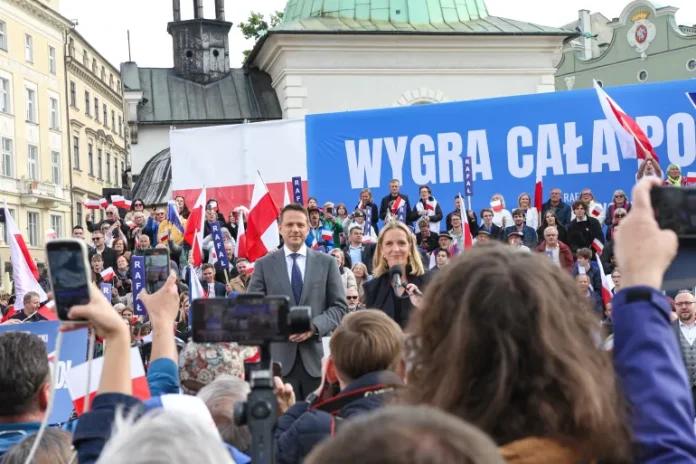Voters in Poland, with a population of 38 million, will vote to replace the incumbent conservative president Andrzej Duda, whose second and final five-year term ends in August.
Although Poland is a parliamentary democracy, the president wields considerable influence. He is the commander-in-chief, has veto power, shapes foreign policy and plays a role in the national discourse.
The election campaign in Poland has been marred by numerous scandals, prompting calls to raise the threshold for participation in the race. With 13 candidates in the running, a decisive victory in the first round is unlikely, according to most experts.
The second round of elections will take place on June 1, and opinion polls point to a likely contest between 52-year-old Rafał Trzaskowski, the liberal mayor of Warsaw, and 42-year-old Karol Nawrocki, a conservative historian backed by the Law and Justice party, which was in power from 2015 to 2023.
Both leading candidates support maintaining the US military presence in Europe and have promised to support Ukraine and promote strong defence ties.
Rafał Trzaskowski
Trzaskowski has three higher education degrees, was a scholarship holder in Oxford and Paris, and speaks foreign languages. He is a former Member of the European Parliament and the Polish Sejm, Minister of Digital Development of Poland, and Secretary of State in the Polish Ministry of Foreign Affairs. Over the past seven years, he has been elected mayor of Warsaw twice.
Trzaskowski places greater emphasis on deepening ties with the EU and is a prominent figure in the centrist Civic Platform party led by Prime Minister Donald Tusk. He has promised to defend the independence of the judiciary and restore democratic institutions.
His supporters call him a moderniser representing a “cosmopolitan Poland” oriented towards the outside world. He participates in Warsaw’s LGBT marches and appeals to young urban voters for support.
Karol Nawrocki
Nawrocki is an independent candidate, a historian by education and the head of the Institute of National Remembrance. He has been interested in football and boxing since childhood. While studying in his native Gdańsk, he worked as a security guard in a fashionable hotel, for which he was repeatedly accused of having links to criminal circles.
Before to his presidential bid, he had no experience in public politics and is not known for his oratory skills. He is more sceptical of Brussels and promotes a nationalist agenda.
When Law and Justice was in power, its representatives repeatedly clashed with EU institutions over issues such as the independence of the judiciary, media freedom and migration.
Conservatives praise Nawrocki for dismantling Soviet monuments and promoting patriotic education, while his opponents criticise him for his inexperience and pandering to anti-European sentiments. Earlier in May, Nawrocki met with US President Donald Trump at the White House, which critics saw as Washington’s interference in the Polish presidential election.
The intrigue of the current election is simple. If the candidate of the Civic Platform party wins, the entire political system of the country will be under the control of the ruling team. If the candidate from the opposition Law and Justice party wins, the confrontation between the president’s team and the cabinet could end in a major political crisis and early parliamentary elections. Therefore, both parties view the current elections as a “fight to the death.”
